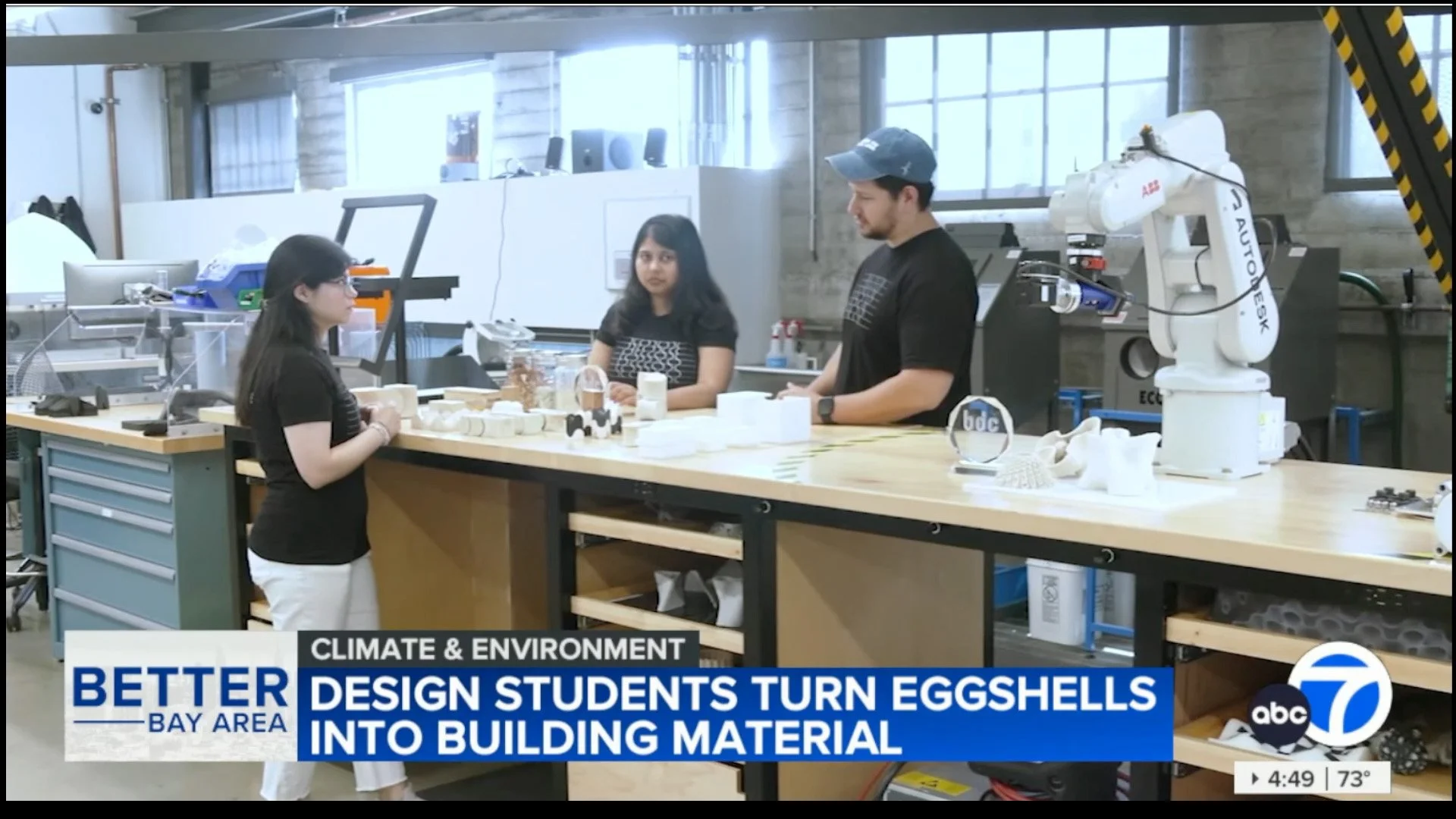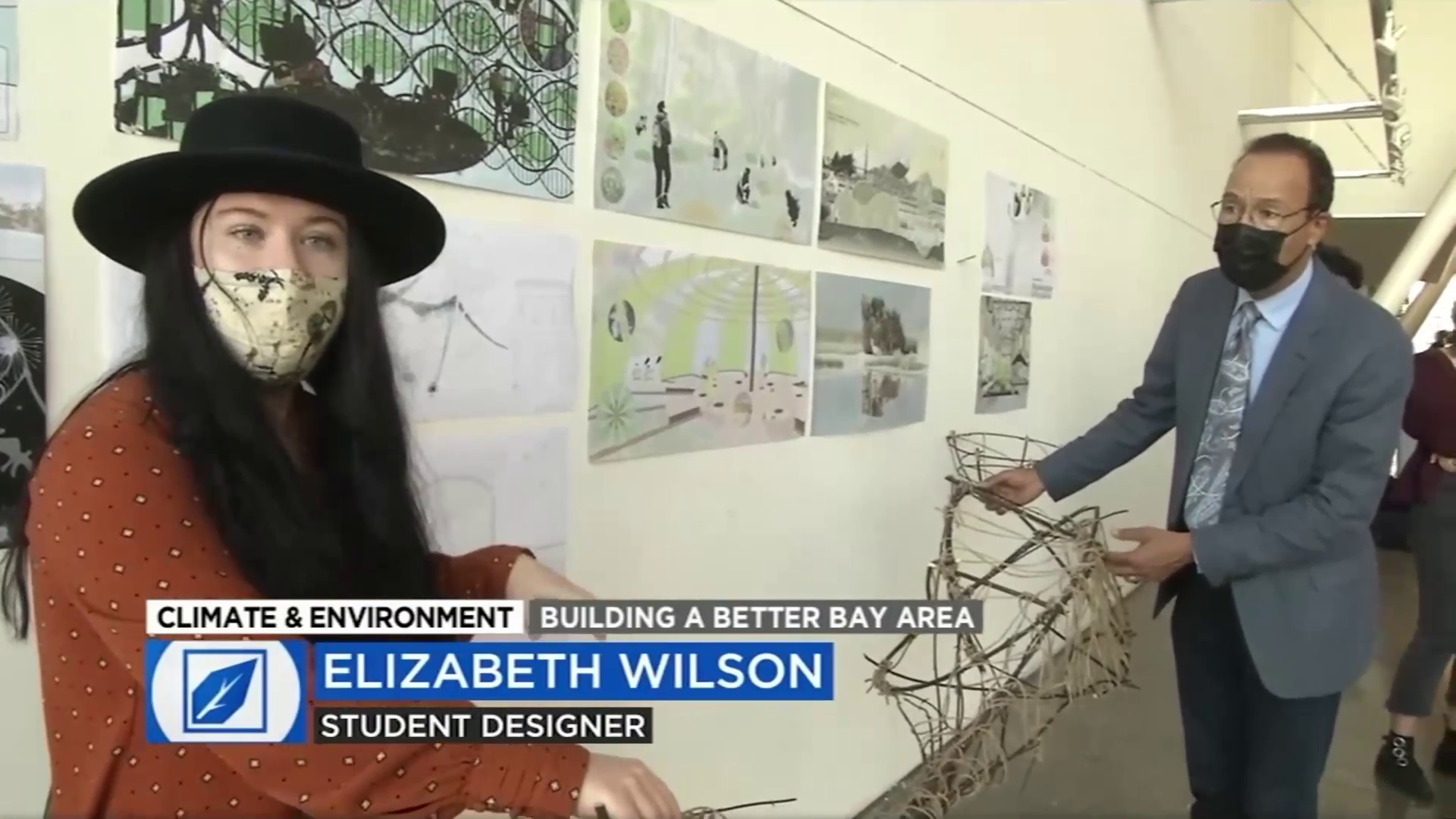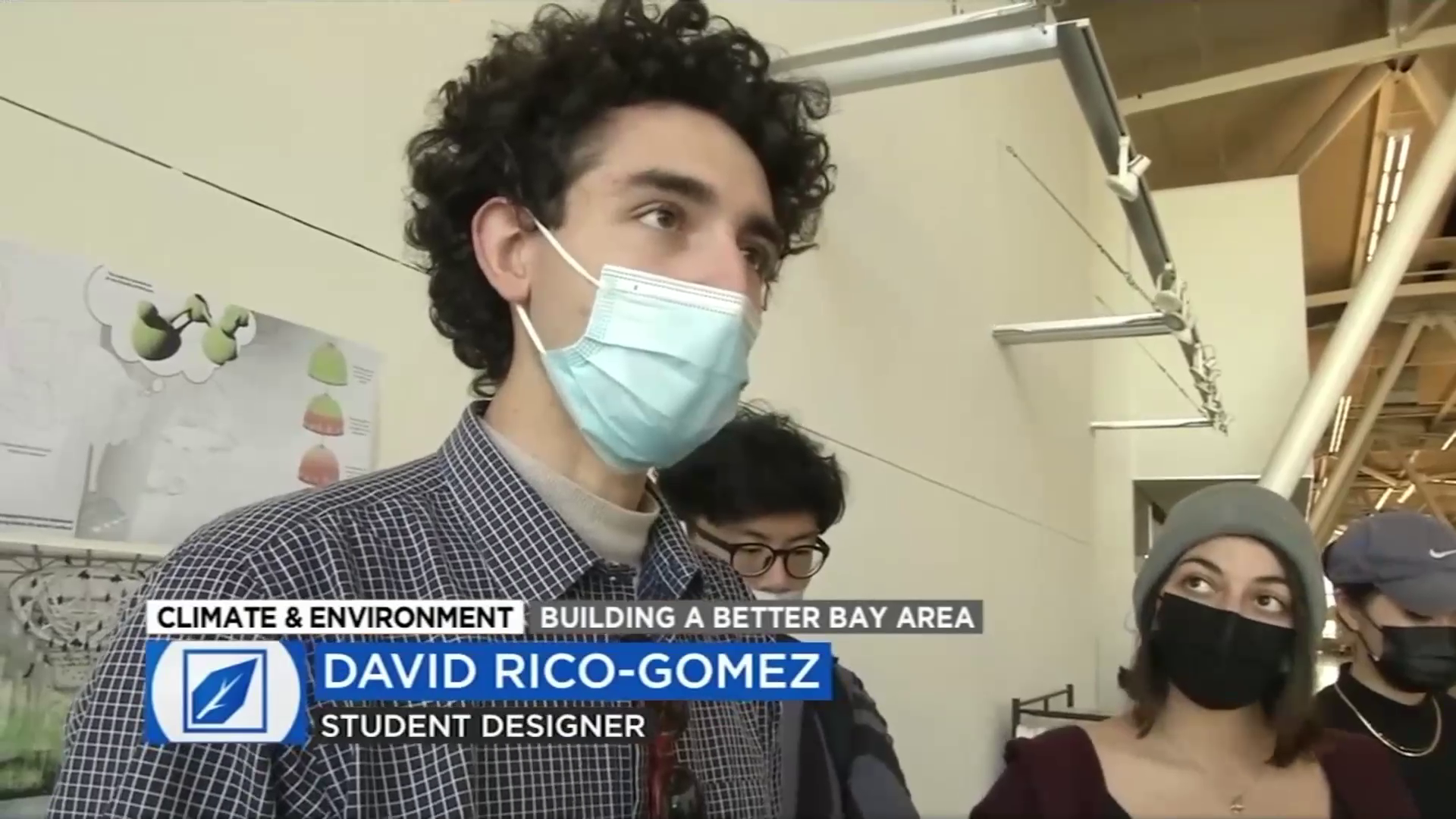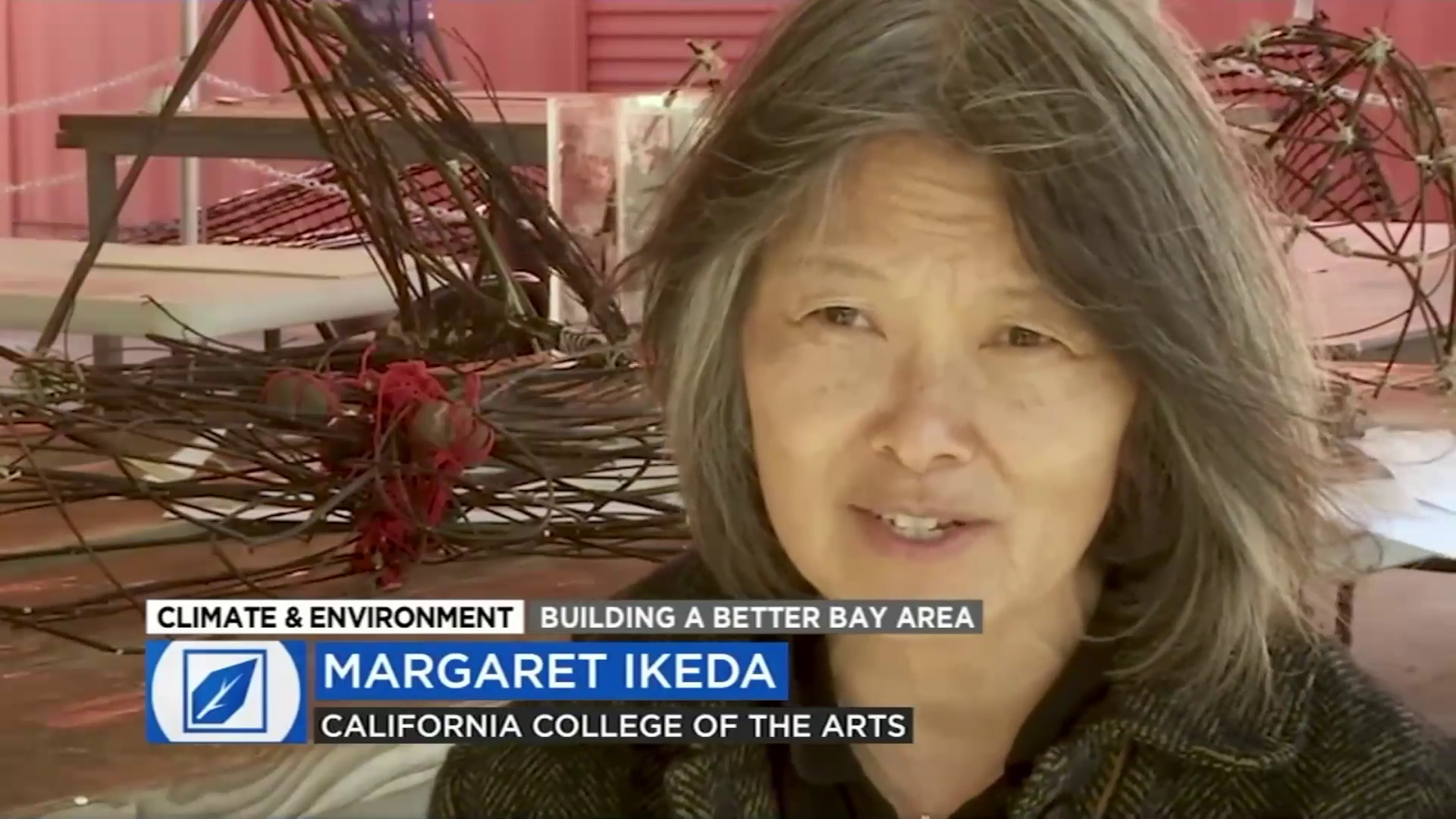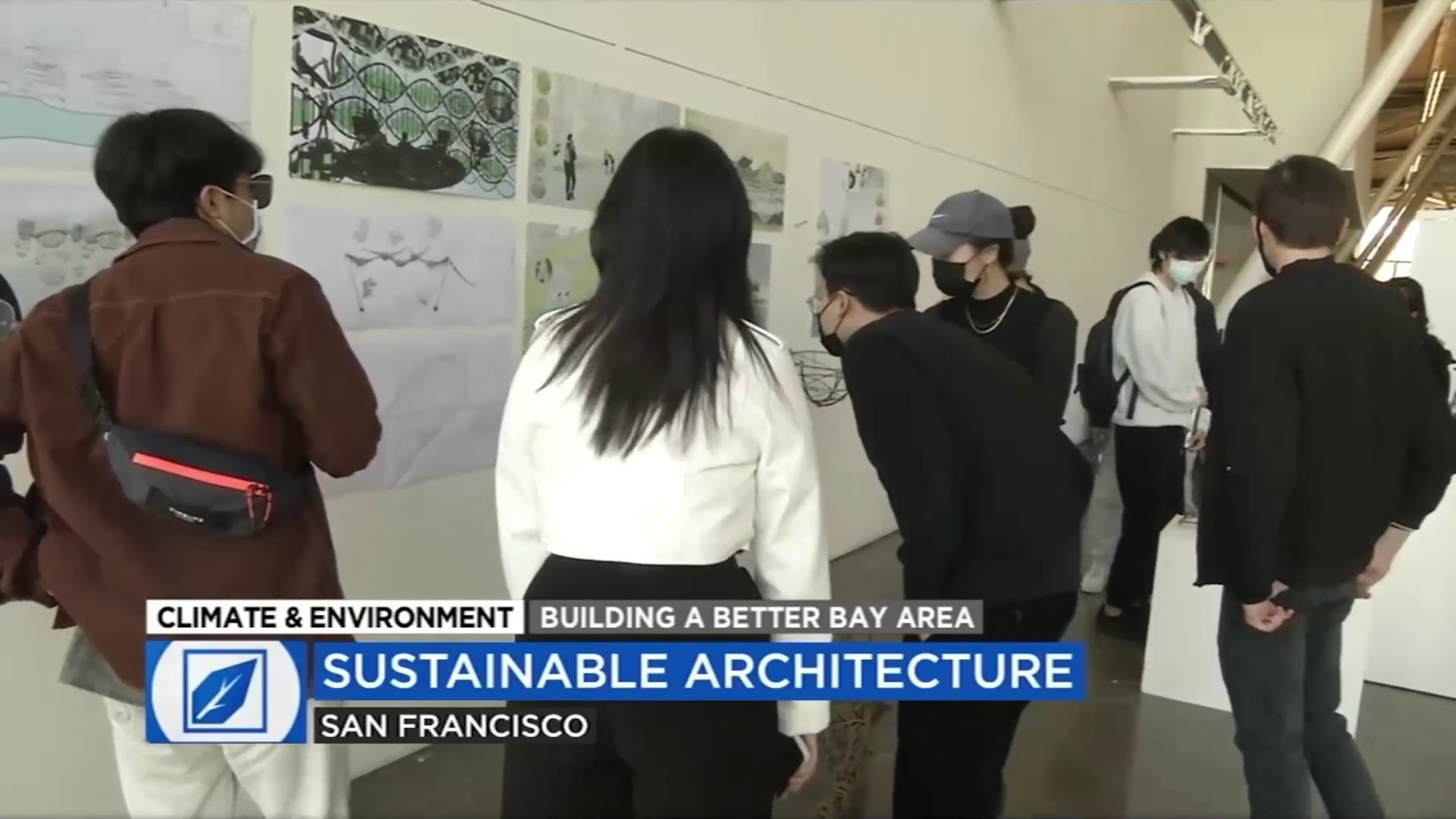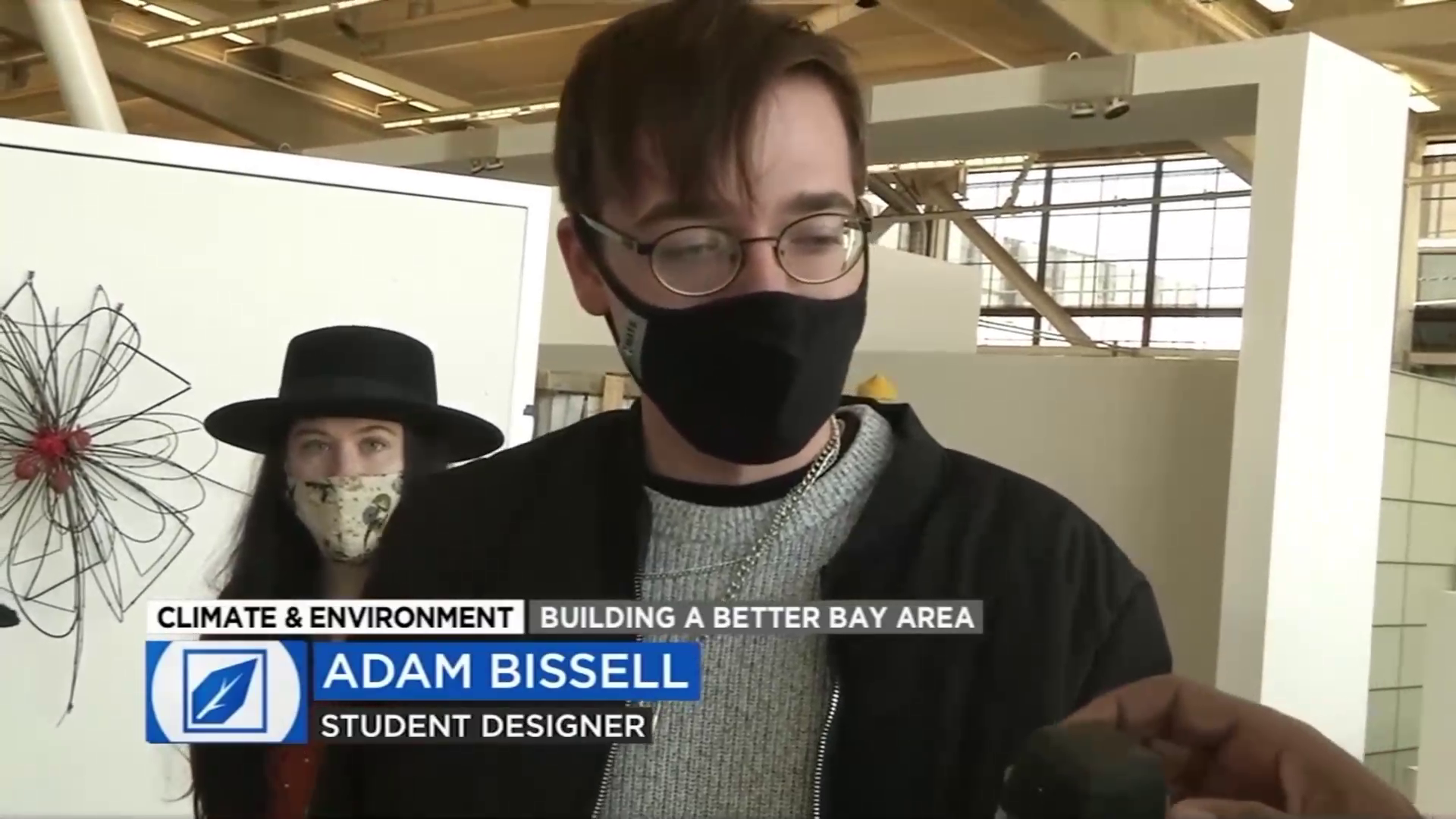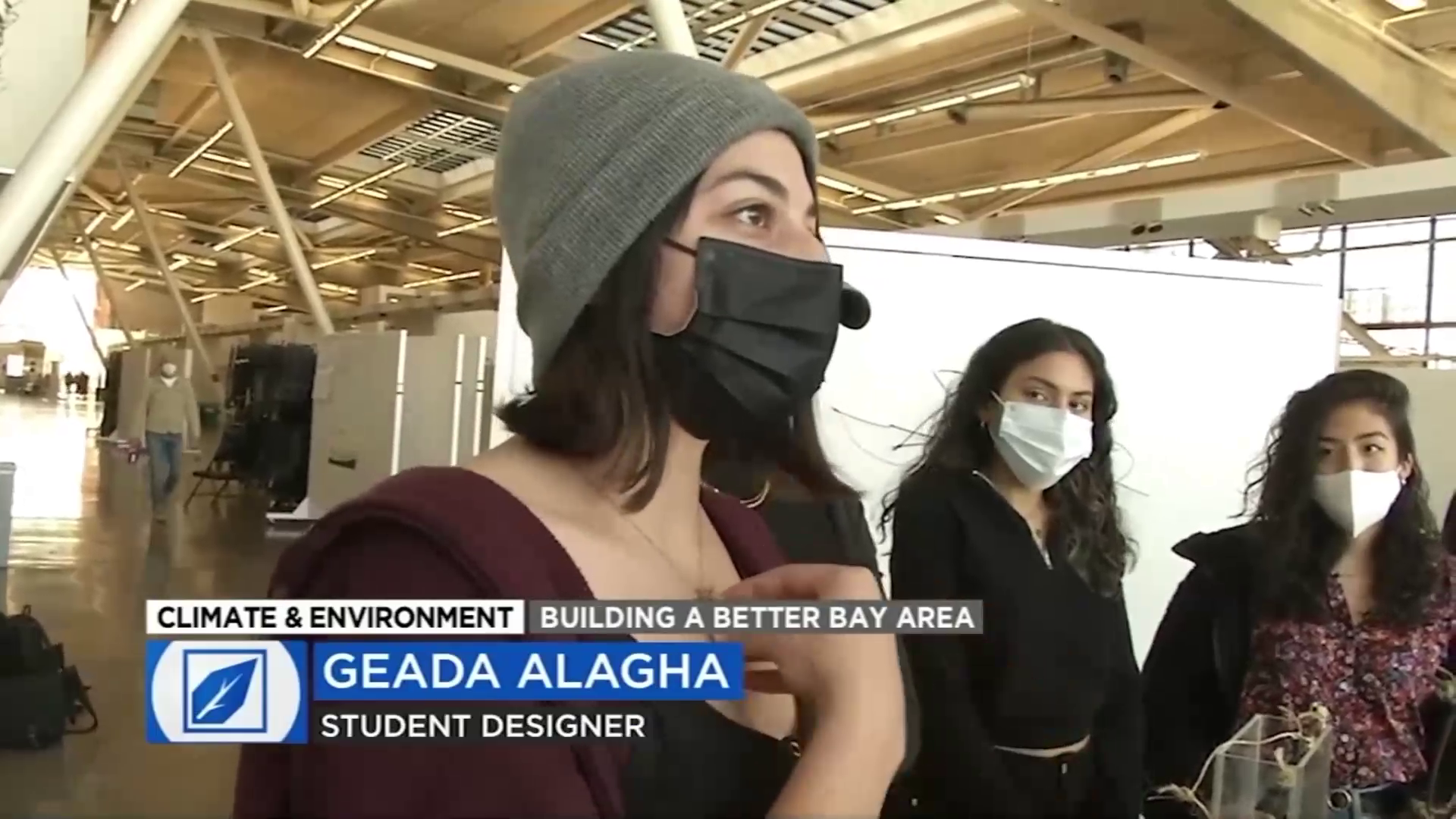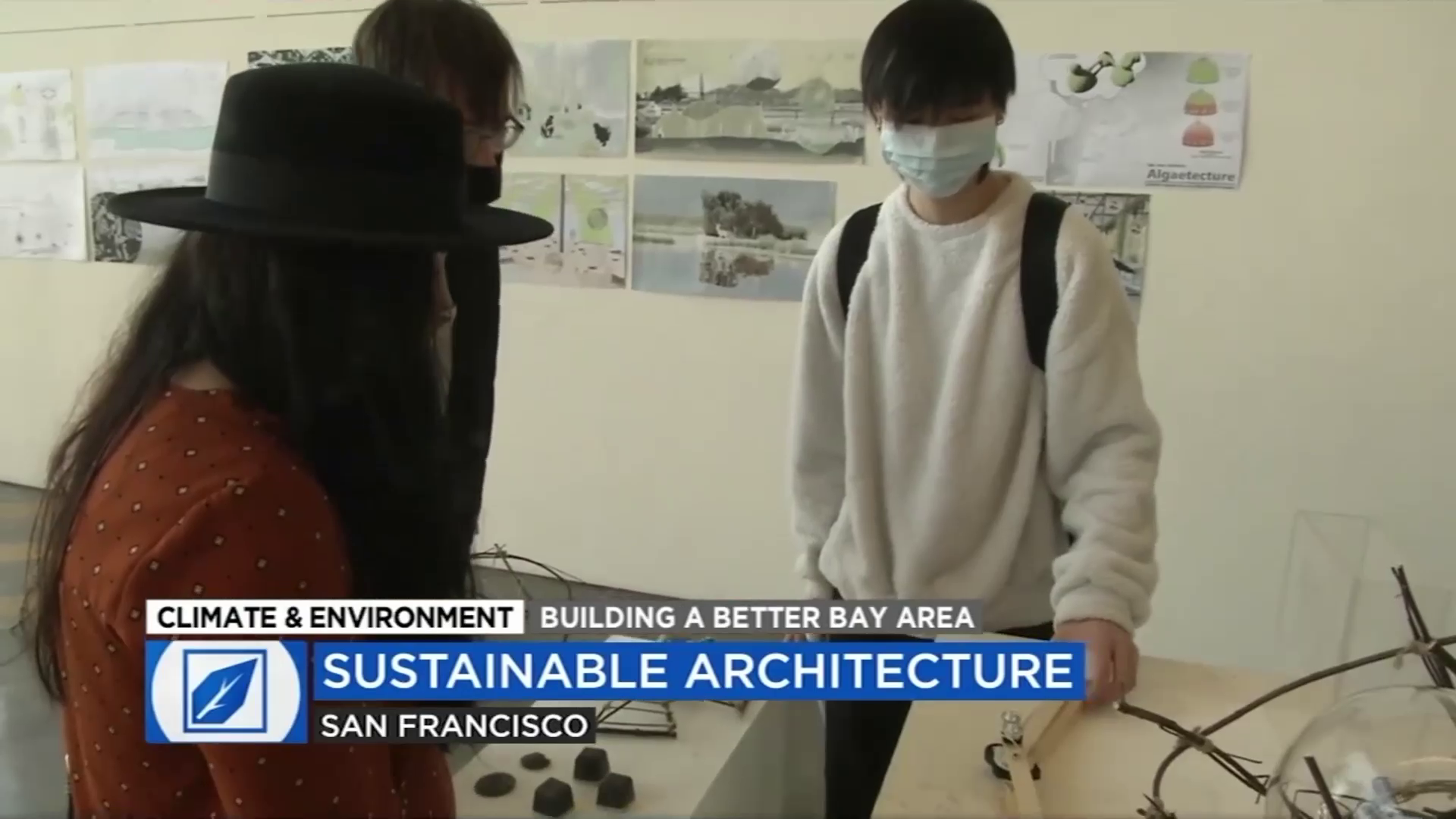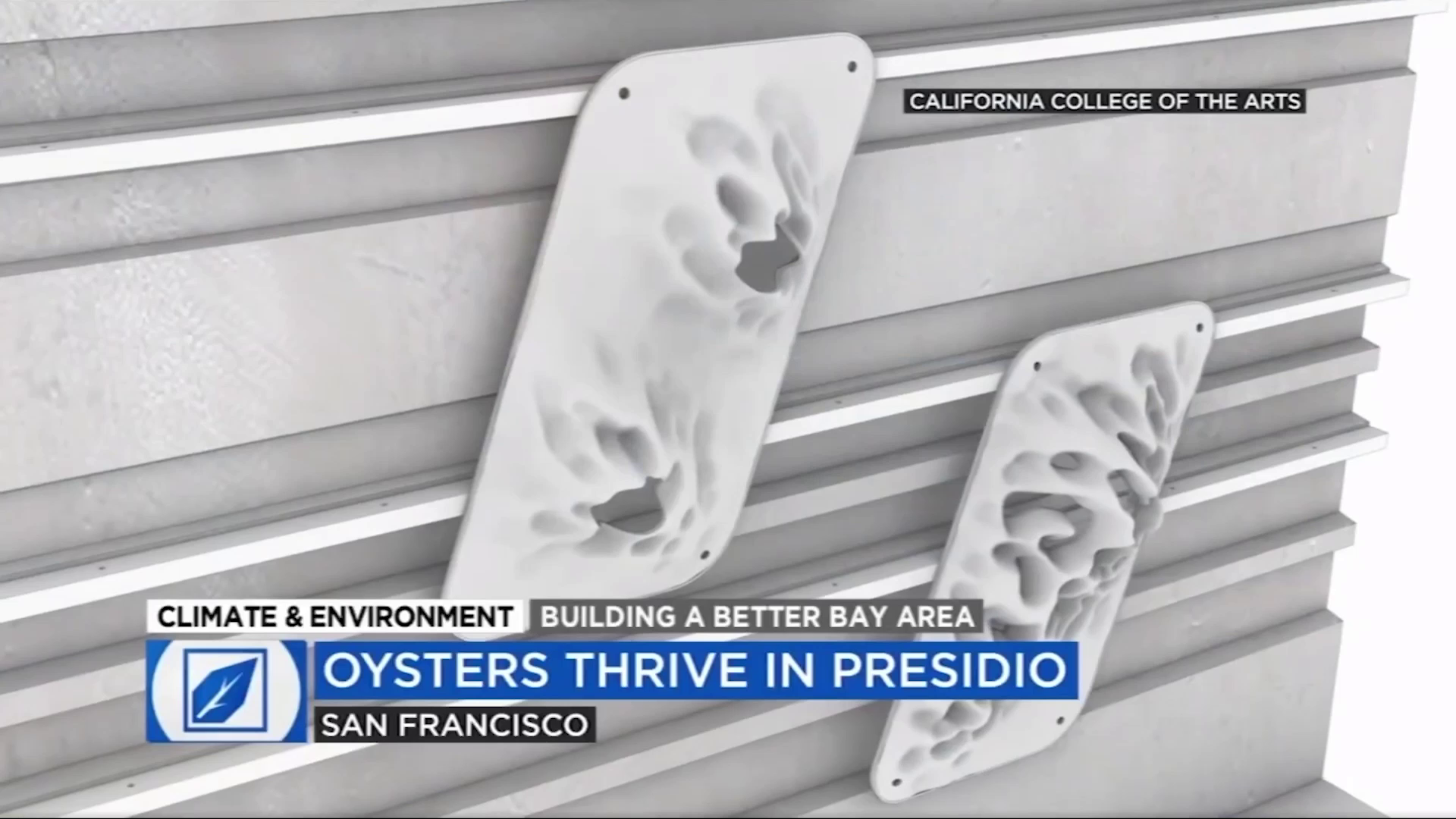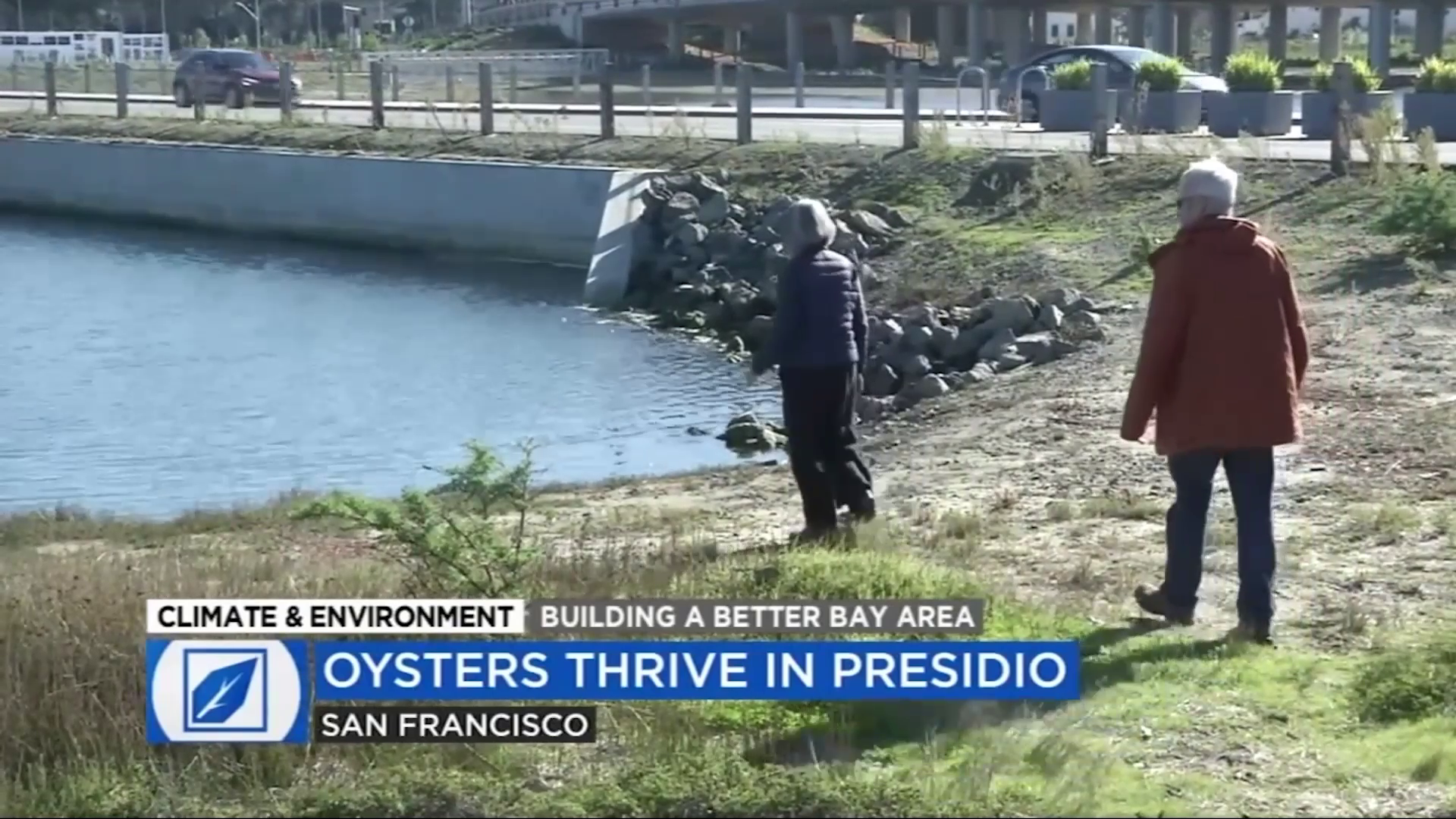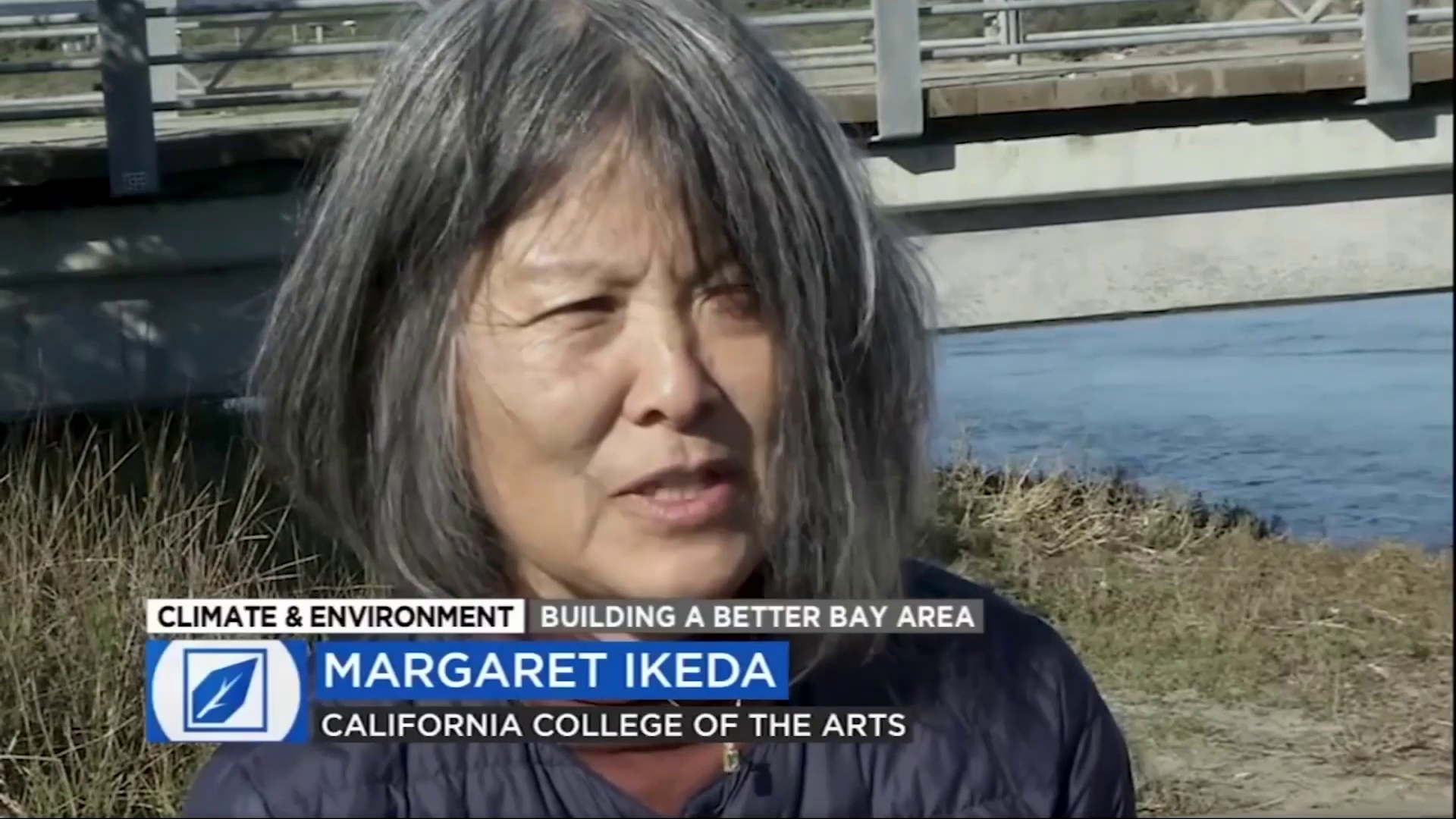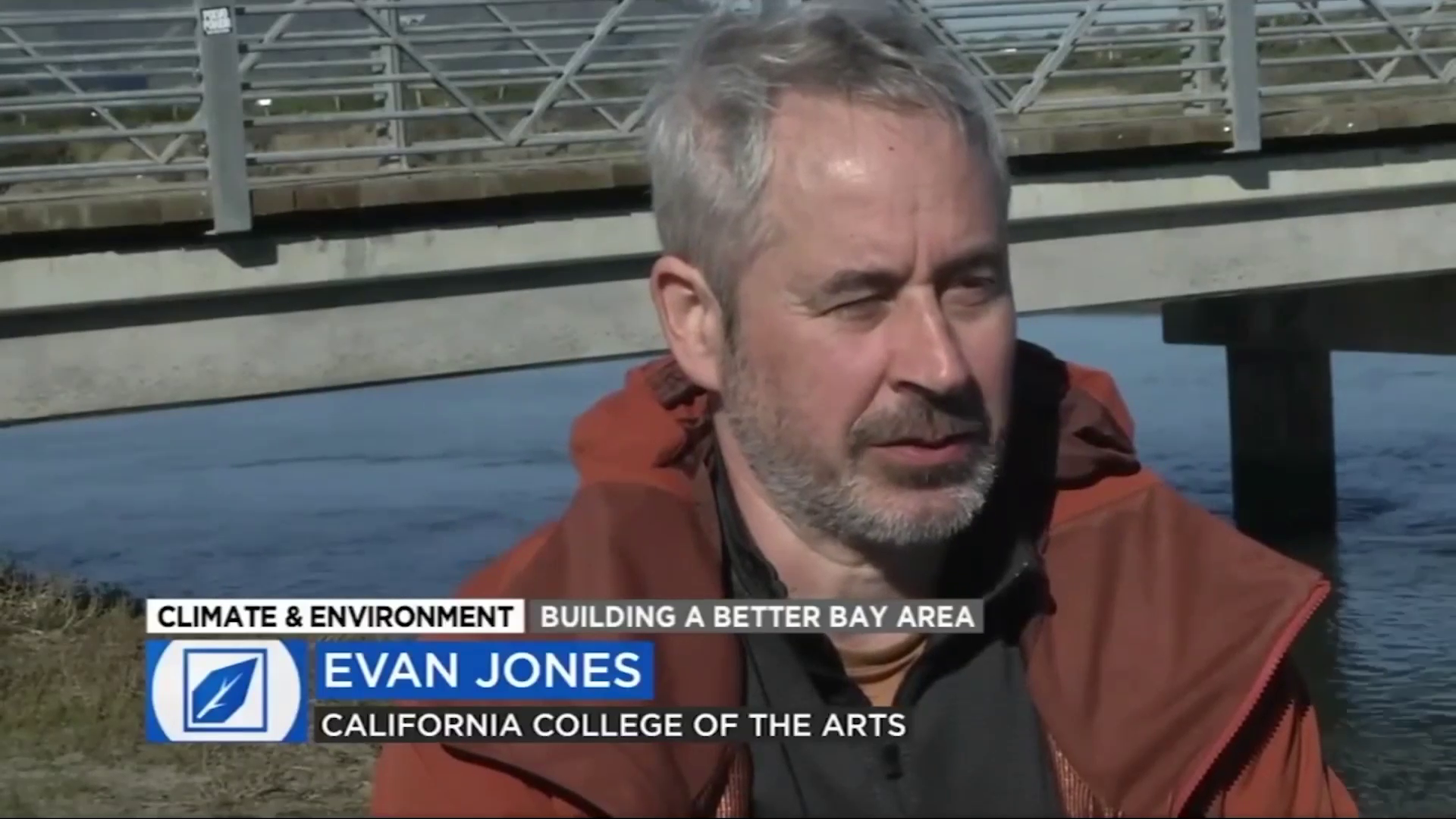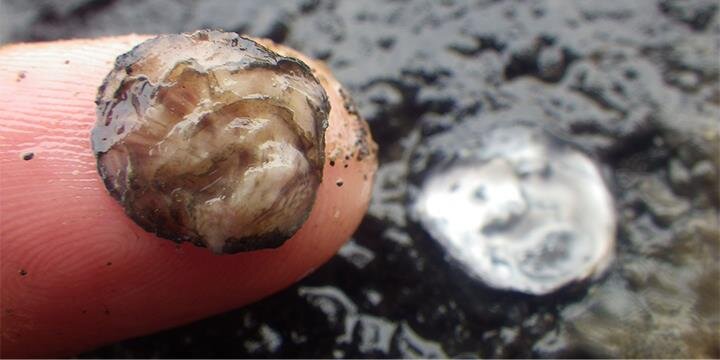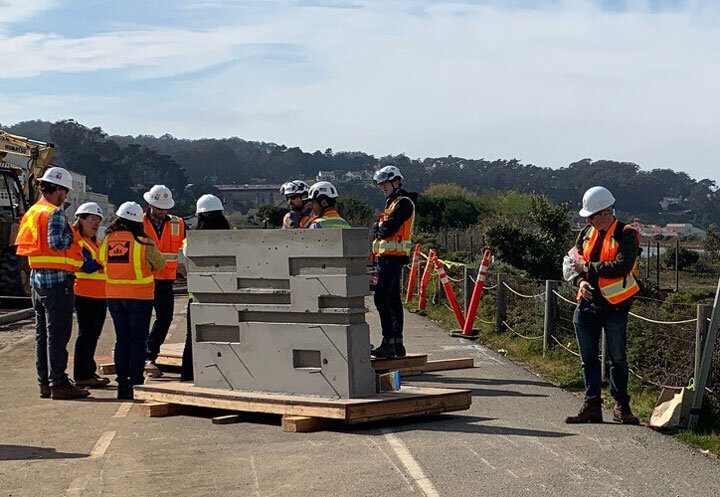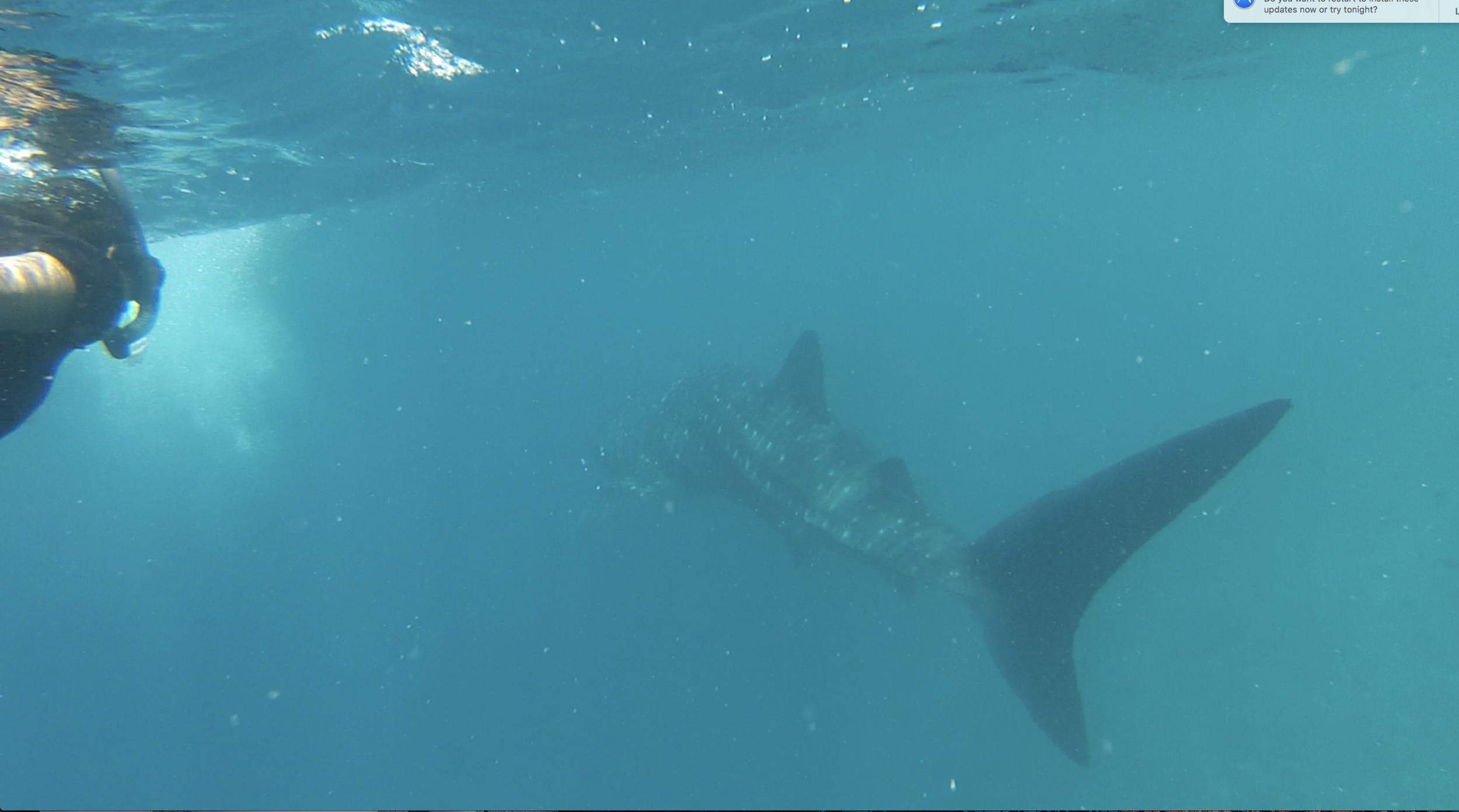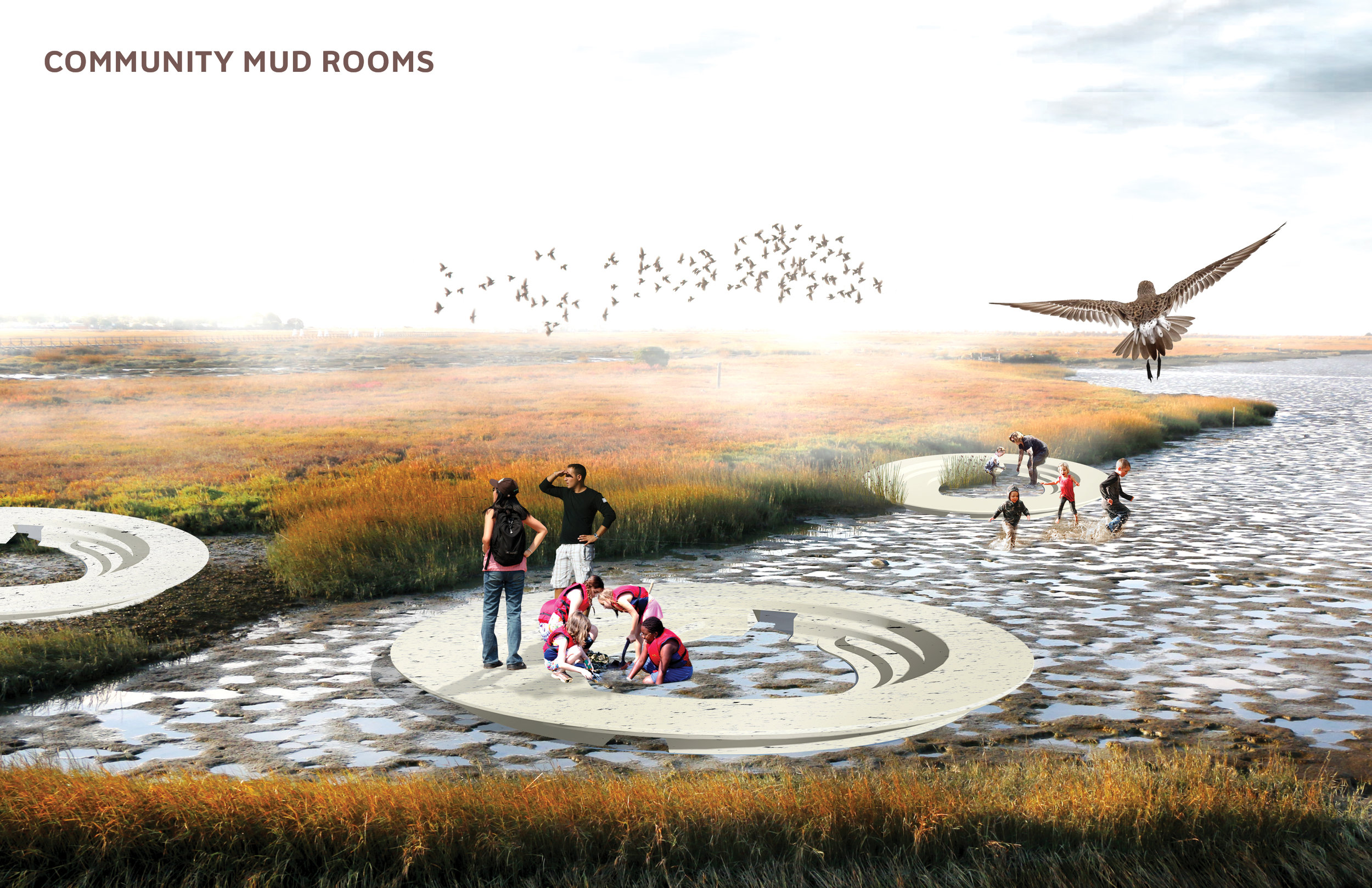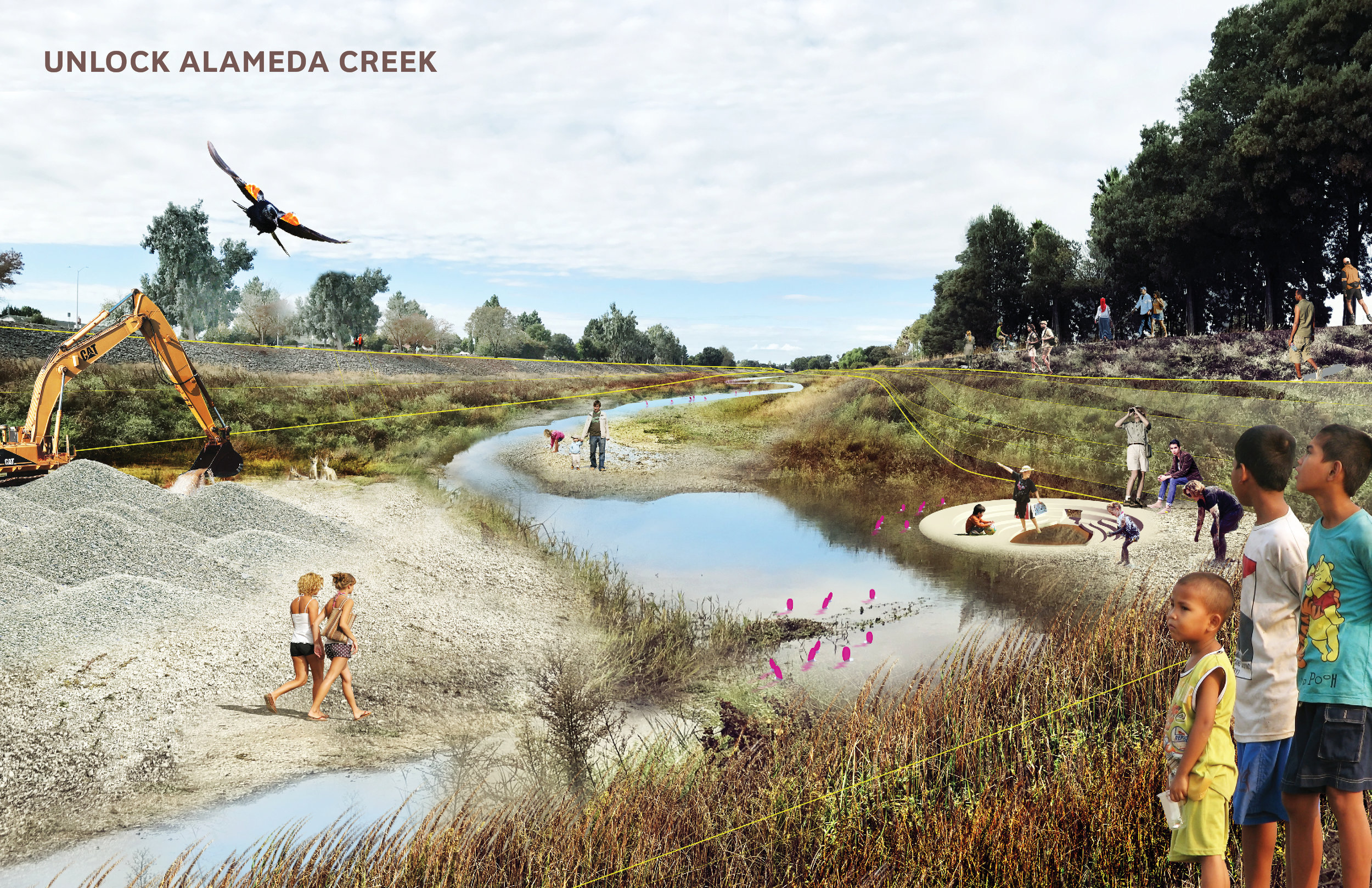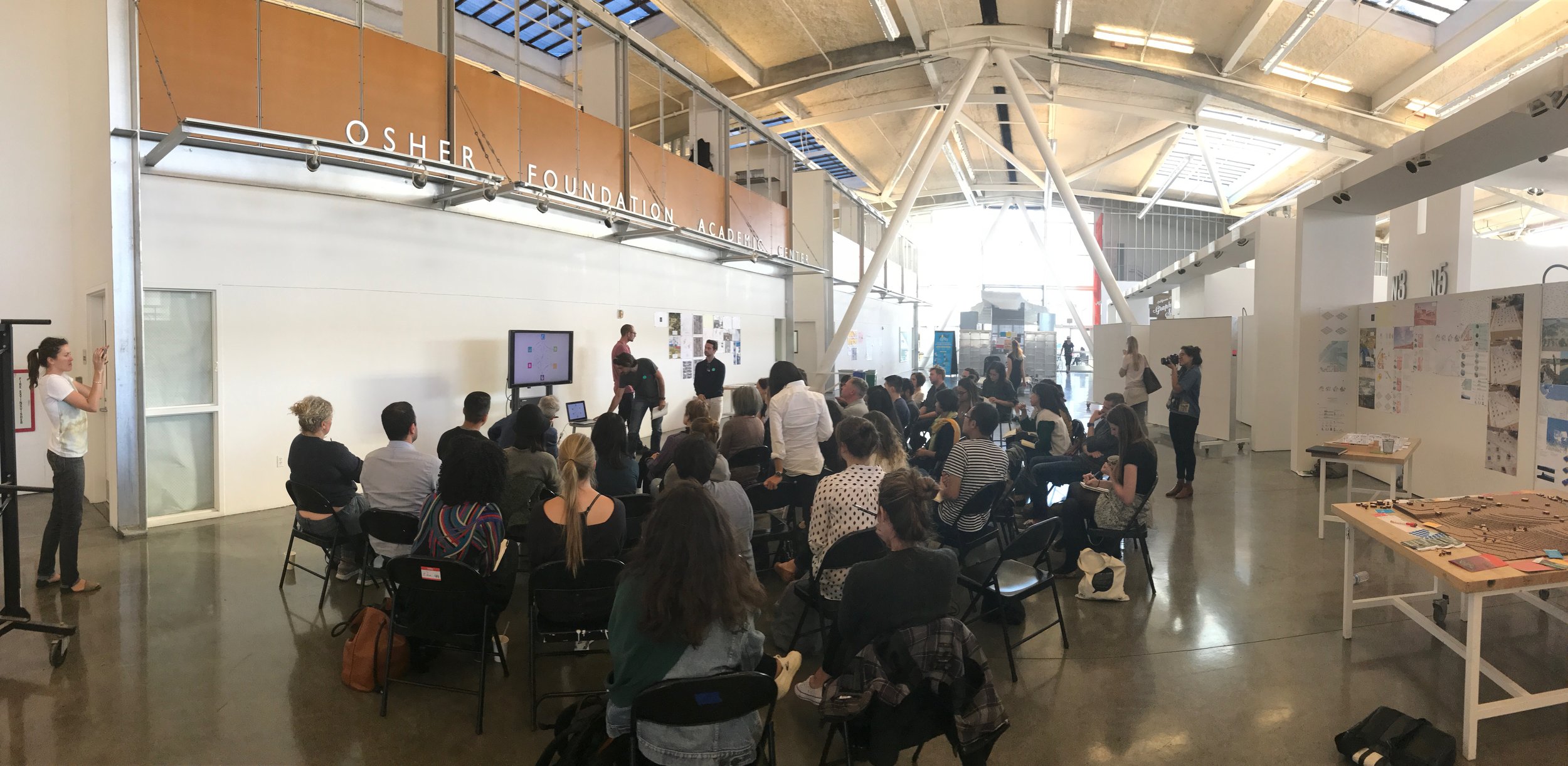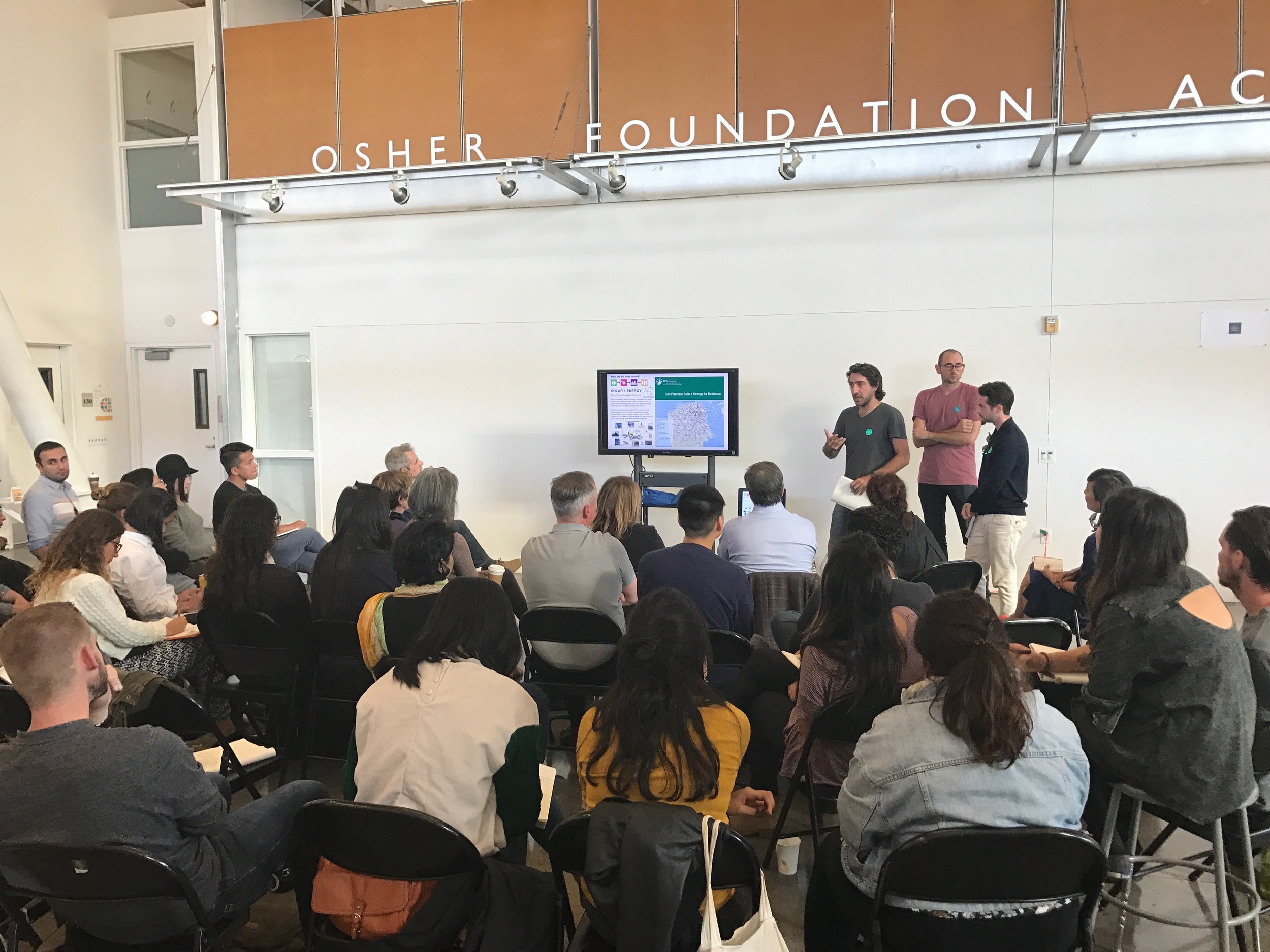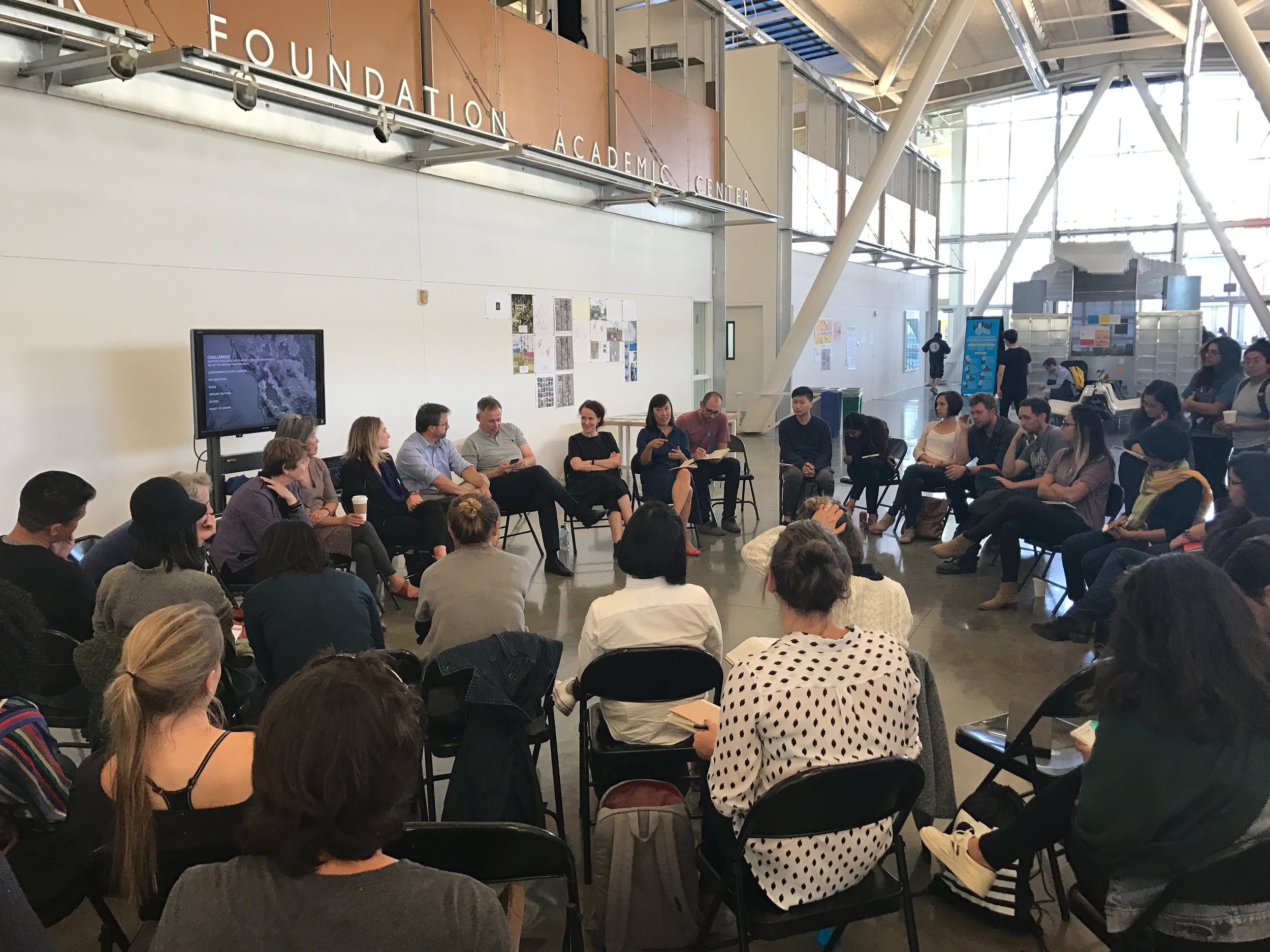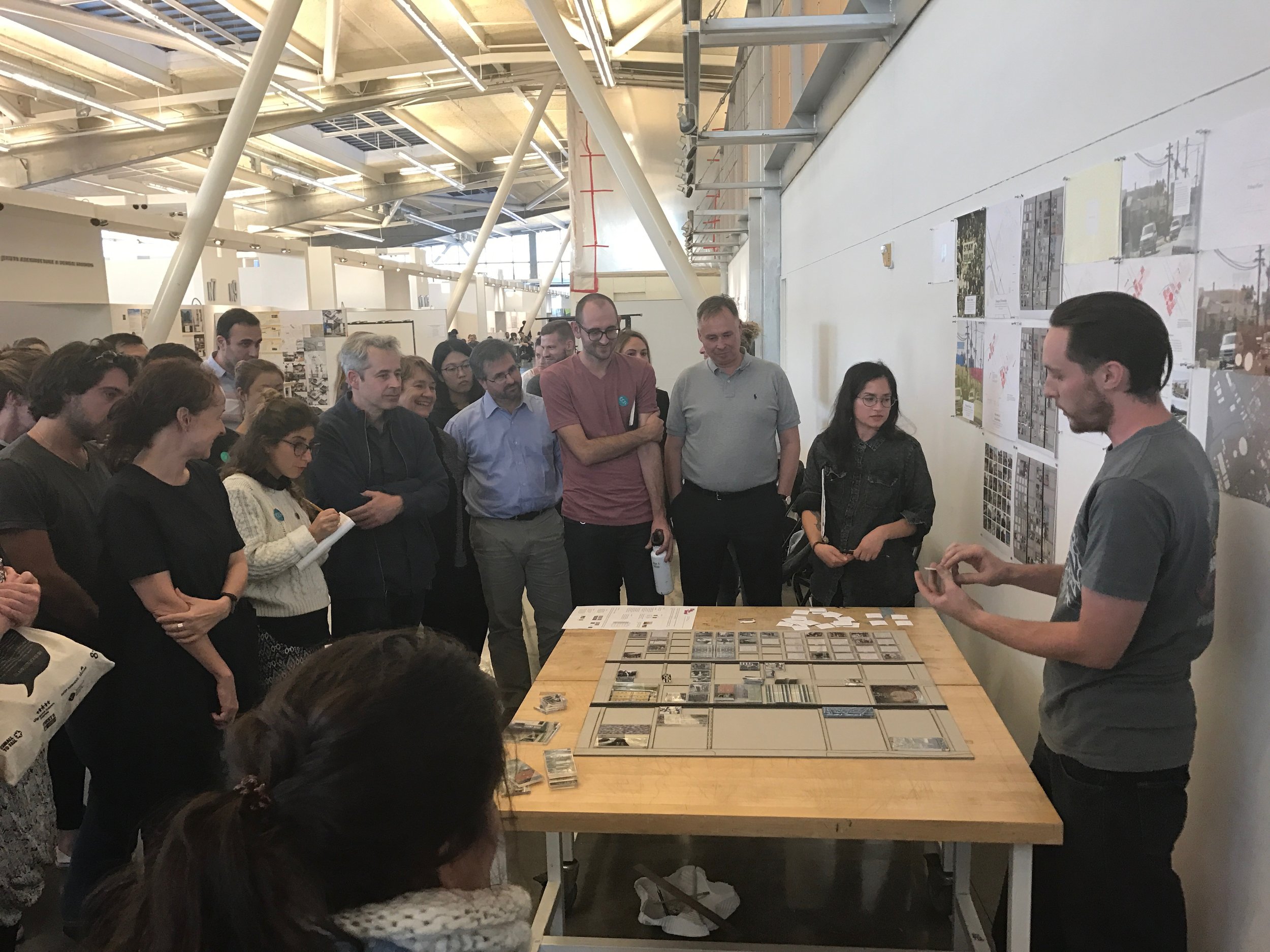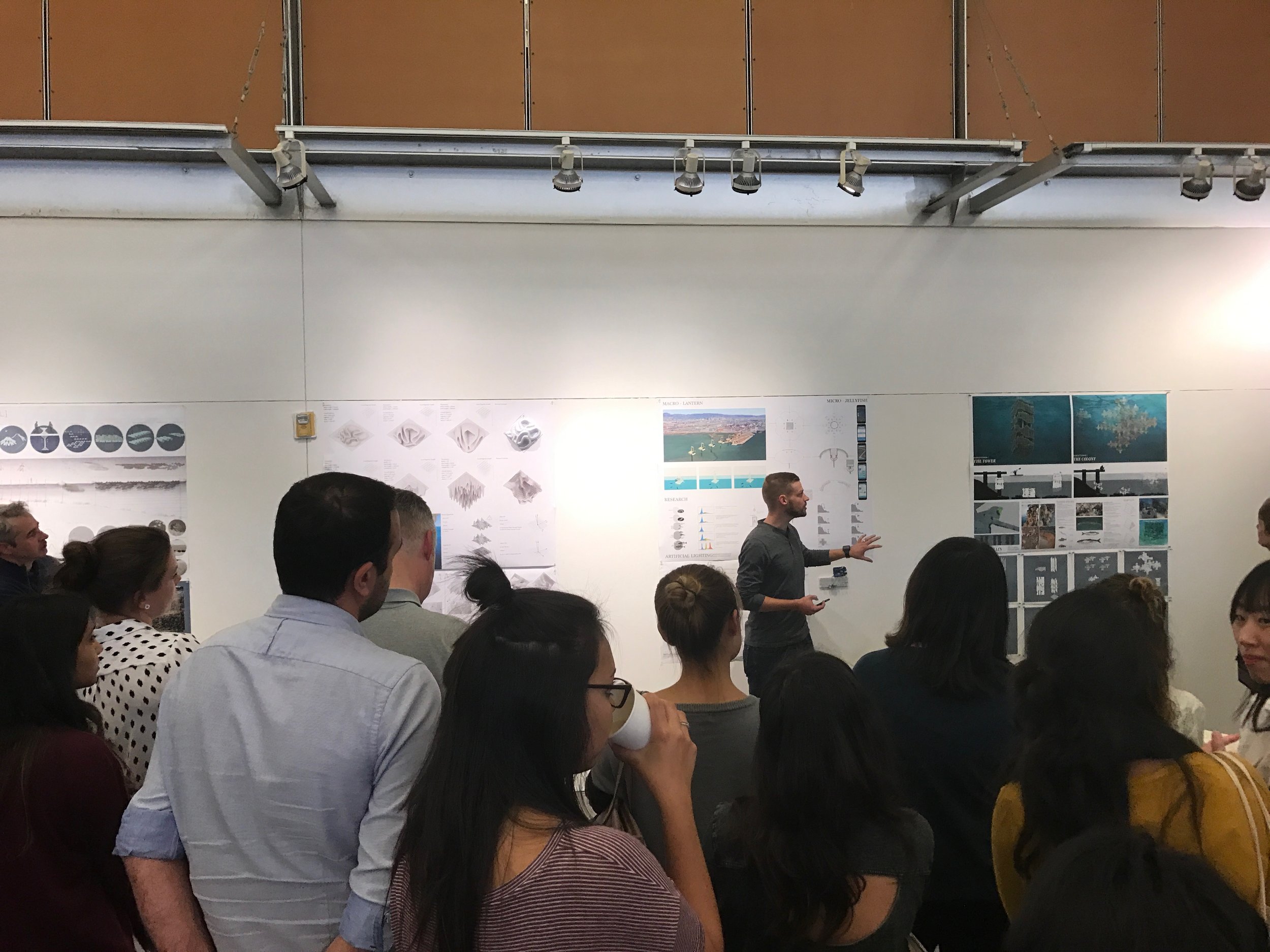ABC7 News recently featured the relocation of AEL’s Float Lab to Clipper Cove on Yerba Buena Island. The Lab will join the Treasure Island Sailing Center’s marine ecology education program, and provide a platform for ongoing research.
BioDesign Research Featured on ABC7 News
ABC7 News recently featured work by students at CCA and UCSF [LINK HERE] The award-winning project, "Shell We Dance?", explores innovative solutions for transforming egg and shellfish waste into sustainable building materials. The project team, led by CCA professors Margaret Ikeda, Evan Jones, and Negar Kalantar, and with UCSF professor Dyche Mullins, worked at Autodesk's Pier 9 Technology Center through an Academic Alliance.
The project tackles the pressing issue of construction waste and carbon emissions by drawing inspiration from natural shell structures. By developing moldable components and a complementary adhesive, the team created a new building system that incorporates living bacteria to enhance structural capacity. This sustainable approach aligns with the vision of reducing the environmental impact of the construction industry.
CCA Students: Miti Mehta, Negar Hosseini, Kianoush Hamedi, Jesus Guillermo Macias Franco
Project Leads: Margaret Ikeda, Evan Jones, Dr. Negar Kalantar, Dr. Dyche Mullins
UCSF Students: Alex Hong, Claire Kokontis, Camille Moore
Advisors: Ali Farajmandi, Dr. Anastasia H. Muliana, Dr.Alain Goriely, Dr. Gabor Domokos
BioDesign Research Featured on ABC7 News
ABC7 News recently featured work by students in Margaret Ikeda’s Fall 2021 Constructed Ecologies course, in which students developed concepts for artificial habitats made from natural materials. The feature showcased the recent installation of a prototype for a bird habitat, fabricated from local acacia and willow branches, at San Francisco’s Presidio, where the Architecture Ecologies Lab has an ongoing partnership. The story featured interviews with Prof. Ikeda and student Geada Alagha (M.Arch 2022).
Link: “Student-led biodesign architecture project adds habitats to SF's Presidio”
Constructed Ecologies Research Featured on ABC7 News
ABC7 News recently featured work by students in Margaret Ikeda’s Fall 2021 Constructed Ecologies course, in which students developed concepts for artificial habitats made from natural materials and inspired by Indigenous material practices.
Link: “'Idea of hope': SF college students design sustainable architecture that helps ecosystems flourish”
Presidio Reef Research Featured on ABC7 News
The Presidio Culvert Reef project was recently featured in a story on ABC7 News, by Spencer Christian and Tim Didion. AEL directors Margaret Ikeda and Evan Jones were interviewed on site for the story, discussing how the AEL’s work designing and fabricating ecological substrates is contributing to oyster habitat restoration in the Presidio’s Crissy Marsh.
Link: “Combining infrastructure and ecology: Oysters find new home in SF’s Presidio tidal marsh”
AEL Partners with Presidio Trust on Native Oyster Habitat Restoration
AEL directors Evan Jones and Margaret Ikeda have been working for the past year with the Presidio Trust and the National Park Service on innovative ecological substrates for native oyster habitat restoration at the newly expanded wetlands at Quartermaster Reach / Crissy Marsh. The team includes research fellow and CCA M.Arch alum Sean Cunningham, the Benthic Lab at Moss Landing Marine Laboratories, Kreysler & Associates, and support from Autodesk’s Technology Center, San Francisco.
This past year, the team has deployed a series of floating substrate prototypes to test ways to recruit Olympia oyster larvae and encourage their growth in the marsh. This work has informed the design of larger scale, custom-contoured composite panels, which will be installed later this summer as a permanent liners for new culverts that run beneath Mason Street.
For more information on the project, see this news post from the Presidio’s blog.
Photo by Joshua Eufinger
Buoyant Ecologies Float Lab Wins AIA Innovation Award
The Buoyant Ecologies Float Lab, a project designed by AEL directors Adam Marcus, Margaret Ikeda, and Evan Jones in collaboration with partners at the Benthic Lab at Moss Landing Marine Laboratories and Kreysler & Associates, has been recognized by the American Institute of Architects with a 2019 Innovation Award. The Float Lab is a pilot for a floating breakwater, recently launched in San Francisco Bay for a three-year deployment as a floating research laboratory developing new material approaches to resilience and climate adaptation.
The AIA Innovation Awards recognize the exemplary use and implementation of innovative technologies and progressive practices among architects and designers, collaborators, and clients. Recipients include the most technologically advanced and forward-thinking projects by architects practicing internationally.
Jurors for this years awards program included Anthony Hauck (Hypar AEC), Phillip Bernstein, FAIA, (Yale University School of Architecture), Desiree Mackey (GEI Consultants), Sera Maloney (The Foth Companies), and Natasha Luthra (Jacobs).
In their award statement, the jury referred to the Float Lab as “a terrific project that combines pedagogy, sustainability, design technology, practice, and fabrication. This is the future architecture should be building—integration with and enhancement of the natural environment."
Link: Buoyant Ecologies Float Lab wins 2019 AIA Innovation Award
Architectural Ecologies Lab Team Leads Research Trip to the Maldives
Interdisciplinary Cohort Explores Radical Alternatives through Field Work and Public Engagement.
What better way to spend an ecological summer break than investigating the effects of climate change in the highly impacted Maldives? An interdisciplinary team from the Architectural Ecologies Lab did just that. This past July, three California College of the Arts faculty from the Architectural Ecologies Lab joined two scientists for a two-week field trip to the Maldives, an island nation in the Indian Ocean of 1,200 small coral islands, 200 of which are are human-inhabited.
The Maldives face immediate and urgent impacts of sea-level rise caused by climate change, including disastrous, recent coral bleaching due to ocean warming. CCA faculty Margaret Ikeda, Evan Jones, and Leslie Carol Roberts joined Dr. John Oliver of the Benthic Lab at Moss Landing Marine Laboratories and the biologist Jo Guerrero on a visit to numerous islands, conducting field work and sharing research and design work by California College of the Arts faculty and students interrogating ecological changes and how we might mediate the effects through varied approaches.
Professors Ikeda and Jones lead the Buoyant Ecologies Maldives integrated architecture studio, which began work in 2017 to develop speculative proposals for floating communities in the Maldives. Professor Roberts co-directs the Ecopoesis Project, an interdisciplinary initiative of the AEL and CCA’s MFA in Writing Program, exploring how we use language to grasp and process life, human and non-human, in the sixth extinction.
The team’s research brief included field work and interviews to better map and understand the complex island culture, politics, economies, infrastructure, and marine ecology. The team left with optimism about future collaborations and strategies for partnerships this fall semester and beyond.
Highlights:
An evening lecture and panel discussion at The Maldives National University (MNU) with more than 150 attendees, including former president and climate activist President Mohamed Nasheed; Dr. Mohamed Latheef, the Chancellor of MNU, and Dr. Shazla Mohamed, Dean of Engineering, Science and Technology (home of the architecture department).
Professors Ikeda and Jones were invited guest reviewers at MNU for the final studio presentation for a fourth-year undergraduate studio, which explored the planning and development of a community over water.
A two-day exhibition in Male’ (the capital city) of Buoyant Ecologies Maldives studio work, followed the talks. This work had previously been exhibited at the Hubbell Gallery at CCA in February, 2019 (curated by CCA faculty member Michael Bogan) and at the Benthic Lab Open House in April, 2019. This event was an opportunity to meet with the public and discuss the studio projects on exhibit. Many people attended, including representatives from government agencies who were curious about both the adaptive design approaches and the incorporation of sustainable systems. These initial meetings have cultivated relationships with a new constituency who have become an essential resource for this fall’s Buoyant Ecologies Maldives studio, currently underway at CCA.
Professor Roberts led a series of Ecopoesis dialogues with Maldivian students and visitors to the exhibition, interviewing them and discussing local perspectives on how climate change impacts economic, social, and ecological dimensions of daily life.
The island of Dhangethi, the site of the Buoyant Ecologies Maldives studio, was the main focal point of the trip. After a three-hour speed boat trip in heavy monsoon seas, the team spent three days meeting with island residents, learning about the local infrastructure, understanding the island’s hydrology, and recording thoughts on climate. Most of their time was spent on the water, including snorkelling with the majestic whale shark, observing the marine eco-tourism industry, and talking to local divers. The biologists, both divers, explored an adjacent marine sanctuary, and documented the shallow and deep lagoons that skirt the island of Dhangethi. Dhangethi, with a population of 500, is looking to grow its tourist economy. The implications of a heavier human footprint on water use and effluent were explored and discussed with local leaders.
To better understand the Maldives economy, which is based on high-end, foreign-funded resorts and tourism, the team visited the Conrad (Hilton) Resort, home to a famed underwater restaurant and representative of the industry. The Conrad biologists explained the hotel’s coral restoration scheme and took the AEL into the waters for a closer view.. The next stop was the Banyan Tree Resort, a global hotel group based in Singapore. Banyan Tree has a reputation for serious commitment to marine biology research. Their resident marine biologist, Steve Newman, has more than two decades of dive work and research around coral and marine life in the Maldives. In addition, he is on a government panel that looks at how to better manage eco-tourism across the country. Connected to a research university in the UK, the Banyan Tree routinely hosts PhD students conducting research about the local ecologies. The hotel is also one of the only marine biology labs in the country. The AEL team saw documented extensive coral bleaching on this warmer inner island atoll and observed how sharks and other reef species were adapting. Oliver continues discussions with the biologist at Banyan Tree lab about possible research collaborations in the coming years.
Isha Fathmath, a 2018 Buoyant Ecologies Maldives student, 2019 CCA M.Arch graduate, and principal of Doric MV architecture based in the capital Male’ with local partner Layana Mohamed, coordinated all the public events and was invaluable to navigating the islands from a local perspective.
There is more to come with both ECOPOESIS and the Buoyant Ecologies team. Roberts and her CCA ECOPOESIS colleague Christopher Falliers are teaching a semester-long graduate seminar ECOPOESIS. This interdisciplinary course looks at embodied messaging around climate change, engaging in form-making and language to articulate climate change and the feelings of the sixth extinction. The Buoyant Ecologies team is incorporating the feedback of all their new partners into a third design studio, titled “A Blueprint for Resilience,” and has been working remotely with an MNU architecture studio sharing ideas around innovative technologies, cultural traditions and ecological adaptations.
Public Sediment Receives $31.4 Million in State Funding
Public Sediment for Alameda Creek, a collaborative project developed by an interdisciplinary team that includes AEL directors Adam Marcus, Margaret Ikeda, and Evan Jones, has received $31.4 million in implementation funding from the State of California.
Read MoreAdam Marcus Receives GSAPP Incubator Prize from Columbia University
Adam Marcus has been selected as one of six recipients of the 2019-2020 GSAPP Incubator Prize, an initiative by Columbia University Graduate School of Architecture, Planning and Preservation to support projects created by GSAPP alumni that advance environmental concerns in architecture and its related fields.
Read MoreBuoyant Ecologies Float Lab Featured in Redshift
The Buoyant Ecologies Float Lab, a project led by AEL directors Adam Marcus, Margaret Ikeda, and Evan Jones, is featured in an article in Redshift by Zach Mortice.
Read MorePublic Sediment for Alameda Creek Wins ASLA-NY Honor Award
The Public Sediment team (which includes AEL directors Adam Marcus, Margaret Ikeda, and Evan Jones) has won an Honor Award from the American Society of Landscape Architects, New York Chapter, for their Unlock Alameda Creek proposal. The project was developed within the framework of the Resilient By Design Bay Area Challenge, a year-long research and design initiative exploring new design approaches to sea level rise and climate change.
Read MorePublic Sediment Awarded Grant from NFWF and NOAA
The National Fish and Wildlife Foundation (NFWF) and the National Oceanic and Atmospheric Adminisrtation (NOAA) recently awarded a coastal adaptation grant to the Public Sediment project, a collaborative endeavor led by SCAPE Landscape Architecture that includes AEL directors Adam Marcus, Margaret Ikeda, and Evan Jones. The grant is in partnership with the California State Coastal Conservancy.
The National Coastal Resilience Fund program supports identified priority regions to enhance fish and wildlife habitats and improve the resilience of coastal communities. In total, $28.9 million of funding were distributed across 35 grants. One of the grants was awarded to the California State Coastal Conservancy for “Gravel Beach and Berm Design for Shorebird Habitat, Erosion Control and Flood Protection” in California, known in the Public Sediment project as the Pebble Dune. The funding will support continued design work on the Public Sediment project, developed through the Resilient By Design Competition, and enhance flood protection infrastructure, wetlands restoration, and public access to 1,300 acres of shoreline.
The Public Sediment team is led by SCAPE Landscape Architecture and includes Arcadis, The Dredge Research Collaborative, TS Studio, UC Davis Department of Human Ecology and Design, Cy Keener, and Architectural Ecologies Lab. See this link for more info on the project.
Public Sediment for Alameda Creek Wins AIACC Award
The Public Sediment team (which includes AEL directors Adam Marcus, Margaret Ikeda, and Evan Jones) has won an AIA California Merit Award in the Urban Design category, for their Unlock Alameda Creek proposal. The project was developed within the framework of the Resilient By Design bay Area Challenge, a year-long research and design initiative exploring new design approaches to sea level rise and climate change.
Read MoreBuoyant Ecologies Float Lab wins 2018 R+D Award
The Buoyant Ecologies Float Lab, a project led by CCA AEL directors Adam Marcus, Margaret Ikeda, and Evan Jones, has been selected for a 2018 R+D Award by Architect Magazine. The project builds upon four years of applied research into ecologically productive materials for waterfront structures, and it was developed in collaboration with marine ecologists at the Benthic Lab at Moss Landing Marine Laboratories and fiber-reinforced polymer (FRP) manufacturers at Kreysler & Associates. The Float Lab is a prototype for a floating breakwater that incorporates an ecologically optimized FRP substrate on the underside, which is designed to encourage the growth of diverse marine invertebrate habitats. The accumulation of marine life is optimized such that the resulting biomass helps to attenuate waves and potentially mitigate coastal erosion.
The jury for this year's R+D Awards consisted of Jackilin Hah Bloom and Florencia Pita of Pita & Bloom, Tom Chung of Leers Weinzapfel Associates, and Randy Deutsch of the University of Illinois Urbana-Champaign. In the award citation, juror Deutsch remarked "The research that this team took was in-depth, interdisciplinary, multidisciplinary, and collaborative. That and how they displayed the results over time was over-the-top impressive.”
The Float Lab recently received a permit from the San Francisco Bay Conservation and Development Commission for a three-year deployment at Middle Harbor Shoreline Park, located in the Port of Oakland. The prototype will be launched later this fall.
Adam Marcus, Margaret Ikeda, and Evan Jones to Present at UC Davis
On Wednesday, February 21, CCA faculty Adam Marcus, Margaret Ikeda, and Evan Jones will present the work of the Architectural Ecologies Lab as part of "Field Dispatches from Resilient By Design" panel discussion at the University of California, Davis.
Public Sediment Presents Design Concepts
On November 15, Public Sediment, one of ten teams selected for the Resilient By Design Bay Area Challenge, presented research and design concepts to a public audience at the Contemporary Jewish Museum in San Francisco.
The team presented three proposals for investing in the San Francisco Bayland ecosystems to buffer vulnerable communities and species from the threats of sea level rise. The proposals incorporate research into ecologically performative materials, floating breakwaters, and aquatic species that CCA faculty Adam Marcus, Margaret Ikeda, and Evan Jones have been developing as part of the Buoyant Ecologies project. All projects are posted here and open to public feedback and comment until December 7, 2017.
Public Sediment is a multidisciplinary design team that views sediment as a core building block of resilience in San Francisco Bay. The team is led by SCAPE Landscape Architecture and includes the Buoyant Ecologies team, the Dredge Research Collaborative, Arcadis, TS Studio, the UC Davis Department of Human Ecology and Design, and the UC Davis Center for Watershed Sciences.
Public Sediment Team Selected for Resilient By Design
Public Sediment, which includes Buoyant Ecologies faculty Adam Marcus, Margaret Ikeda, and Evan Jones, has been chosen as one of ten teams to participate in Resilient By Design’s Bay Area Challenge. The challenge is a collaborative research and design project that brings together local residents, public officials and local, national and international experts to develop innovative solutions to the issues brought on by climate change that our region faces today. Over the course of the next year, engineers, architects, designers and other experts will work with local community members to identify critical areas throughout San Francisco’s Bay Area in order to provide solutions to the region’s sea level rise, severe storms, flooding and earthquakes.
The result will be 10 new implementable projects that offer an imaginative and collaborative approach to resilience. Public Sediment is led by SCAPE Landscape Architecture, a winner of the New York City Rebuild By Design competition. The team is a multidisciplinary collaboration that views sediment as a core building block of resilience in San Francisco Bay. In addition to SCAPE and the Buoyant Ecologies group, team members include the Dredge Research Collaborative, Arcadis, TS Studio, the UC Davis Department of Human Ecology and Design, and the UC Davis Center for Watershed Sciences.
Buoyant Ecologies Students Participate in Resilience Workshop
On October 5, students from two CCA Advanced Studios conducted a workshop and discussion on resilient design with visiting students from the University of Pennsylvania. The Win/Win studio led by Janette Kim and the Buoyant Ecologies studio led by Adam Marcus, Margaret Ikeda, and Evan Jones joined students from the Bay Area Resilient Transportation studio led by Kai-Uwe Bergmann and Matthijs Bouw to share research and discuss different approaches to the challenges of climate change and sea level rise.


